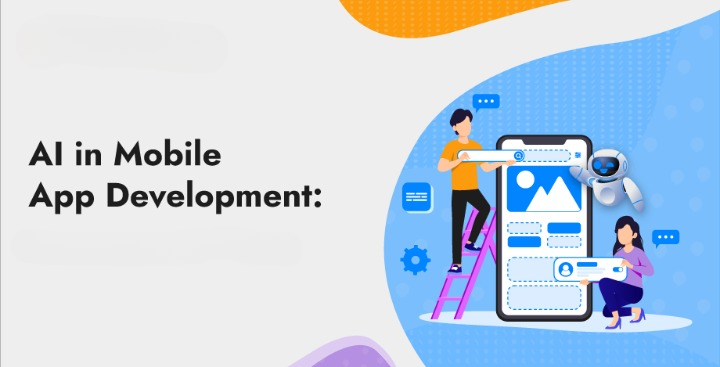Introduction
Artificial Intelligence (AI) is no longer a futuristic dream; it’s shaping the mobile apps we use every day. From virtual assistants to personalized recommendations, AI enhances user experience, efficiency, and functionality. But how exactly does AI integrate into mobile app development? And why should businesses consider hiring a mobile app development company in UAE or a mobile app development company in Riyadh to leverage AI effectively? Let’s dive in!
1. Understanding AI in Mobile Apps
AI in mobile apps refers to integrating machine learning, natural language processing (NLP), and automation to enhance app functionalities. It allows apps to learn user behavior, make predictions, and improve interactions over time.
2. Why AI is a Game-Changer for Mobile App Development
Imagine a mobile app that adapts to your preferences without you needing to adjust settings manually. AI makes this possible by analyzing user data and making intelligent adjustments. This level of personalization keeps users engaged and improves retention rates.
3. Types of AI Used in Mobile Apps
- Machine Learning (ML): Helps apps learn from user behavior.
- Natural Language Processing (NLP): Enables voice recognition and chatbot functionalities.
- Computer Vision: Used in facial recognition and AR applications.
- Predictive Analytics: Helps in forecasting trends and user needs.
4. AI-Powered Features in Modern Mobile Apps
- Voice Assistants: Siri, Google Assistant, and Alexa enhance accessibility.
- Smart Recommendations: Netflix and Spotify suggest content based on user habits.
- Automated Customer Support: AI chatbots handle user queries efficiently.
5. How AI Improves User Experience (UX)
AI-driven UX ensures:
- Faster loading times with intelligent caching.
- Intuitive interfaces based on user preferences.
- Real-time feedback for improved usability.
6. AI in Mobile App Security
With increasing cyber threats, AI helps in:
- Fraud detection: Identifying unusual user behavior.
- Biometric authentication: Face and fingerprint recognition.
- Data encryption: Securing user information.
7. Machine Learning vs. AI: What’s the Difference?
While AI is a broader concept, machine learning is a subset that allows systems to learn from data and improve performance without human intervention.
8. The Role of AI in Personalized App Experiences
AI enables hyper-personalization by analyzing past behaviors and predicting future actions, ensuring users get a tailored experience every time they open the app.
9. Chatbots and AI Assistants in Mobile Apps
AI chatbots like ChatGPT and customer support bots enhance engagement by providing instant responses, reducing wait times, and improving customer satisfaction.
10. AI in E-commerce and Retail Mobile Apps
E-commerce apps use AI to:
- Offer personalized shopping recommendations.
- Implement AI-driven chatbots for better customer service.
- Optimize inventory management with demand forecasting.
11. AI for Healthcare and Fitness Apps
Healthcare apps leverage AI for:
- Remote patient monitoring.
- AI-powered diagnosis.
- Personalized fitness and nutrition plans.
12. AI in Travel and Hospitality Apps
AI enhances travel apps by:
- Offering intelligent booking recommendations.
- Predicting weather and travel conditions.
- Providing AI-driven virtual tour guides.
13. How a Mobile App Development Company in UAE Uses AI
A mobile app development company in UAE integrates AI into custom solutions, ensuring:
- Seamless user experiences.
- Advanced analytics for business growth.
- Scalable and secure applications.
14. AI in App Monetization and Revenue Growth
AI helps businesses maximize revenue through:
- Personalized advertising.
- In-app purchase suggestions.
- Dynamic pricing strategies.
15. Future of AI in Mobile App Development
As AI evolves, we can expect:
- Smarter and more intuitive apps.
- Greater use of augmented reality (AR) and virtual reality (VR).
- Enhanced security measures to protect user data.
Conclusion
AI is redefining mobile app development, making apps smarter, more efficient, and highly personalized. Businesses looking to leverage AI should consider partnering with a mobile app development company in UAE or a mobile app development company in Riyadh to ensure innovative and future-ready solutions.
FAQs
1. How does AI enhance mobile app performance?
AI optimizes mobile apps by improving speed, providing personalized experiences, and automating tasks for efficiency.
2. Can AI-powered apps work offline?
Yes, some AI functionalities, like on-device machine learning, allow apps to function without internet connectivity.
3. How does AI improve mobile app security?
AI detects fraud, enables biometric authentication, and secures data using advanced encryption methods.
4. What industries benefit most from AI-driven mobile apps?
Industries like healthcare, e-commerce, finance, travel, and entertainment benefit greatly from AI integration.
5. Why should businesses in UAE and Riyadh invest in AI mobile apps?
With growing digital transformation, AI-powered apps offer a competitive edge, enhanced user experience, and increased revenue potential.

















































